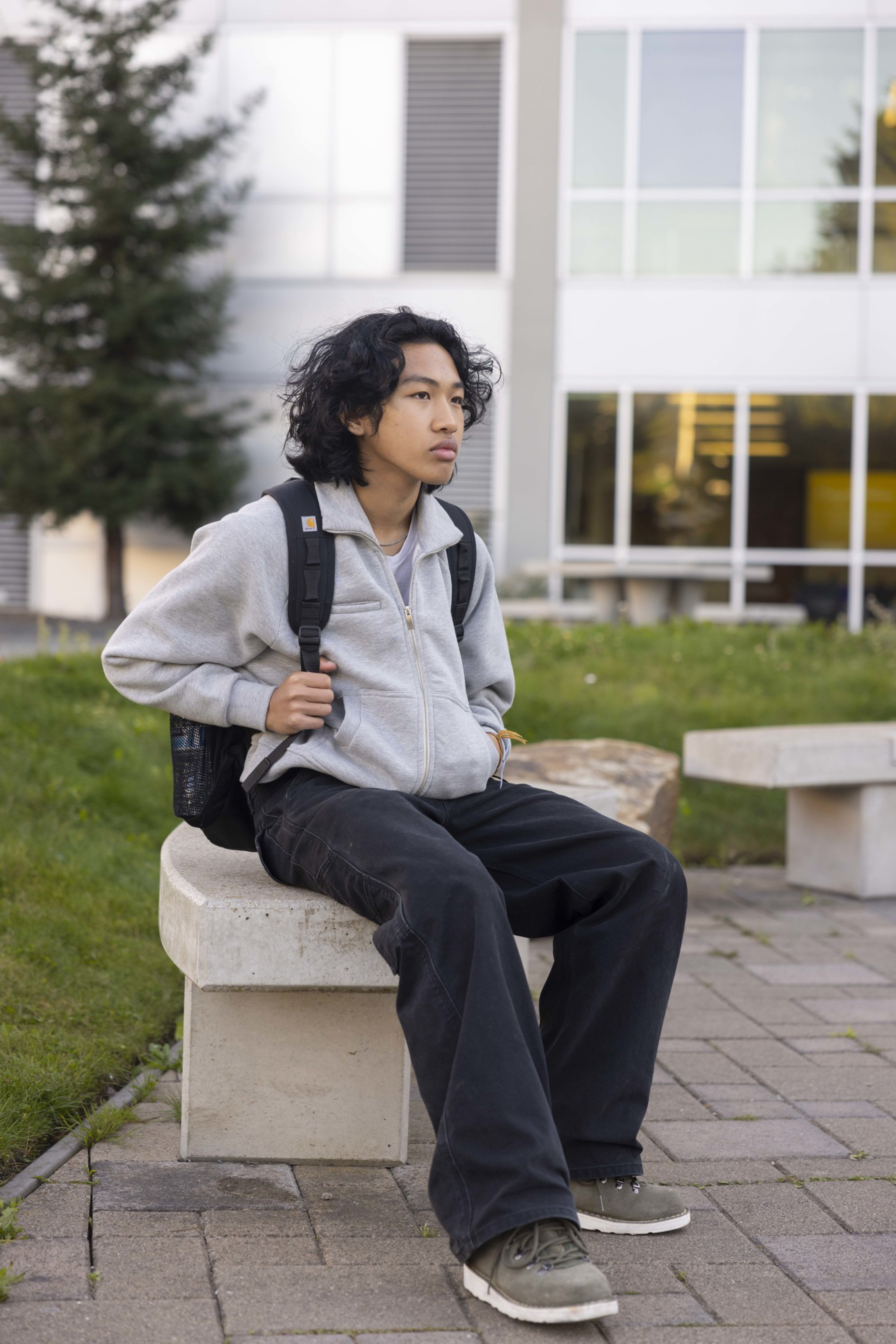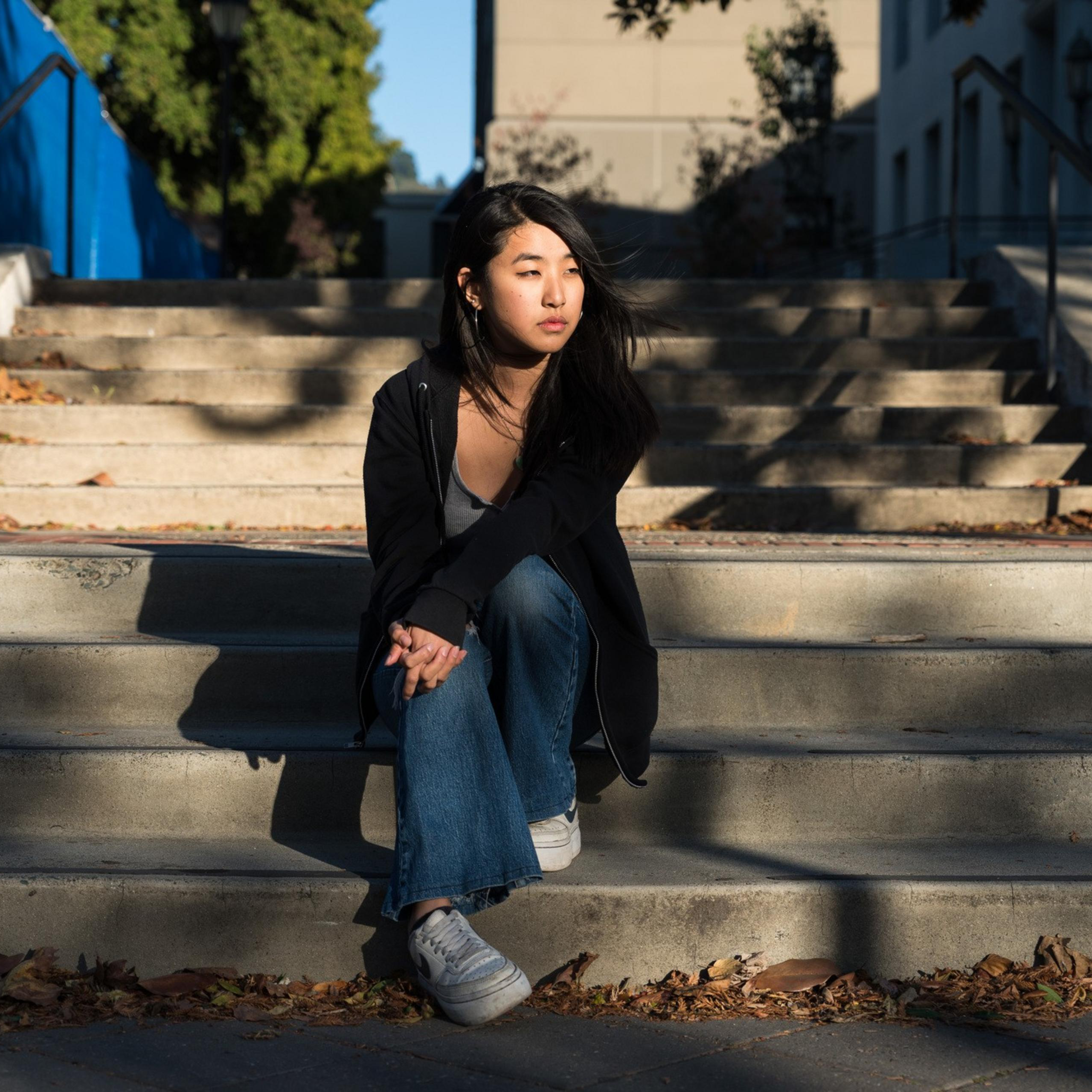San Francisco State student Sam Gonzalez, 23, voted for Biden last time but didn’t support Harris in 2024. In fact, he didn’t vote at all this time. Gonzalez said that a president who represents diversity as a social ideology is most important to him. But he didn’t see that in either candidate.
“I grew up around a lot of Mexicans, Asians, and African Americans, and that shaped the character I’ve become. There’s no right or wrong, but I was pretty much stuck,” he said.
Gonzalez only voted for Biden in 2020 because his parents pushed him to.
“My parents were mostly influencing me,” he said. “But I’m 23 now. I’m living independently — you get exposed to what reality is. Maybe by 2028 I can choose someone that represents my ideals.”
How does he feel about Trump’s return to office? “Honestly, it really doesn’t affect me.”
Though Harris won an estimated 54% of the 18-29 vote, according to Edison Research exit polls (opens in new tab), that’s 7 percentage points below how Biden performed with the same age group in 2020.
On Wednesday, The Standard spoke with students at the University of California Berkeley and San Francisco State University and found that many did not vote or expressed a general apathy toward the process. Those who didn’t vote had different reasons, but the impact was the same. Even in the Bay Area, even in Kamala Harris’ hometown of Berkeley, Gen Z’s support of her wasn’t a given.
Not voting — accidentally or on purpose
Across the Bay in Harris’ hometown, UC Berkeley student Emma Neal, 22, didn’t vote, because her dad didn’t drop off or mail in her ballot, which she’d filled out at home in Marin several weeks before.
“I was crying when I realized that it wouldn’t get in,” Neal said. That disappointment only deepened as the night wore on and it became clear that Trump would once again be president. “I’ve been really shocked,” she said on Wednesday. “This has made me realize that I’ve been living in a bubble.”
On the cusp of graduating from college and considering where she might live next, the results convinced Neal she couldn’t bear to live in a red state — though California’s rejection of strengthened rent control and banning involuntary servitude also stunned her. “I feel a bit lost,” she said.
Twenty-one-year-old DJ is another Berkeley student who didn’t vote because his ballot was at home (in his case, left blank in San Diego). He didn’t feel strongly enough to get it sent to him and hadn’t followed any of the state or local elections either. While he believed most of his Gen Z friends voted for Harris, the California or Berkeley measures hadn’t been a topic of conversation lately.
The Standard spoke with several San Francisco State University students who did not cast their ballots. Some cited apathy, others ambivalence toward the Democratic party and neoliberalism, while a majority pointed to the Biden-Harris administration’s handling of the ongoing war in Gaza.
“I feel like Muslims and Arabs were screwed either way,” said Maryam, a 23-year-old Muslim woman and SF State student. “The ongoing genocide — I feel like neither of them are going to solve it. She’s been in office, and she could have solved this.”
Maryam begrudgingly voted for Joe Biden in 2020 and considered voting for Jill Stein this time, along with her friend Raghat, 20. In the end, neither of the women chose to vote.
“We decided not to because it was obvious that [Harris] wasn’t going to win,” said Raghat.
Fellow SF State student Rowan Slagle, who described himself as a Democrat, also didn’t vote for Harris, or at all, because of Gaza. For him, seeing Democrats in swing counties with high Arab populations like Dearborn, Michigan, voice vocal opposition against the Biden-Harris administration’s response to the war in Gaza helped clarify his ideals as a voter.

“Kamala lost because of her stance on Palestine,” he said. “California is always going to be a blue state, and I feel like unless you’re in a swing state, it really doesn’t matter.”
He “probably” would have voted if he were eligible in a swing state like Pennsylvania, Slagle said. “But I really don’t know. It should be about who I believe in, not about who is worse than the other person.”
Eschewing the parties
A group of 18-year-old engineering students, all of them male and Latino, sat around eating lunch on the quad of SF State Wednesday. One of them, who identified himself only as Oswald, said he didn’t vote because he doesn’t “care about politics.”
“People go crazy over that stuff, and I don’t want to deal with any of it,” he said. “I’m just not interested.”
When asked which he would pick if he had to choose between the major political parties, Oswald asked, “Which one is Trump? I’d probably vote for that one.”
His friends Andre and Kyle said they don’t pay attention to politics and don’t have strong opinions about political issues either.
A general ambivalence about the election is something that 20-year-old Berkeley student Karma has seen with some of her peers. While they didn’t want a Trump win, Harris’ impact on the ongoing conflict in Gaza convinced them either to abstain from voting or go with Stein.
“That irritated me,” Karma said. She’s a registered independent but voted for Harris, who she feels is unfairly saddled with making the situation in Gaza worse. She blamed social media for convincing several friends not to vote for Democrats. The outcome of the election “sucks,” she added.
Fillmore resident and SF State student Sebastian Nguyen, 18, said he is neither a Democrat nor a Republican and didn’t want to place his bet on either candidate. “What [the Democrats] are trying to do — I just can’t take Kamala serious sometimes. It’s like she’s playing around too much. She’s not pressing on serious matters.”


“It’s a really hard day to be a Democrat,” said 20-year-old Creighton, a student at UC Berkeley. Trump’s appeal to Gen Z voters felt depressingly predictable to him. “Trump did a lot of campaigning towards our age demographic. There was a lot of shit he did with various celebrities, like different rappers, different Twitch streamers,” he said. “That type of stuff appeals to people my age that aren’t as informed about politics or aren’t as aware of actual policies and are, you know, just kind of after a vibe or a brand or a feeling. Obviously Trump supplies the better slogans, the better clips.”
With Harris, the vibes were apparently off.
For Zero, an 18-year-old Berkeley student, a vote for socialist candidate Claudia De la Cruz felt like a protest against a two-party system in a state that would swing blue regardless. Plus, Harris’ appeal to moderates felt frustrating. “Most of my peers voted either Harris or a third party,” they said. “Some of my friends abstained from voting in the presidential election, but voted downballot.”
‘Voting is the least we can do’
Berkeley student Paulina, 19, voted, but knows several people in her age group who didn’t. “If you don’t, it’s your decision, but it’s like, what are you trying to achieve?” she said. “Voting is the least we can do.”
She described the results of the election as “appalling” and “really embarrassing” for the country. “I wish more young people would vote, I really do,” she said.
Nineteen-year-old Cal student Leia was also disappointed in the outcome. She spent Wednesday morning crying in bed. “I didn’t check the final count Tuesday night, and it was devastating to hear,” she said. She thought that the situation in Gaza impacted Harris’ popularity with younger voters, including some of her friends, but that the world would be worse for a Trump win.
“I’m very scared for women, for people of color, for LGBTQ folks, for immigrants,” Leia said. “For anyone that is a minority, to be honest.”
By contrast, fellow Cal alum Kelly (a Gen Z cusper, since she was born in 1996) said that the state results disappointed her the most. “I can’t believe we didn’t outlaw slavery,” she said, referring to Proposition 6. “That’s wild.”
The passage of Proposition 36, which increases penalties for theft and drug crimes, also riled her: “It feels like the War on Drugs again — it feels like Raegan-era vibes,” she said.

She remembers the 2016 election as being a radicalizing moment, spurring her to focus on local politics, community organizing, and mutual aid efforts in her community. She wonders whether this election will have the same effect on her younger Gen Z peers, many of whom may not have voted.
“If this is their first election that they’ve been a part of, I don’t know what it will do to either motivate or demotivate them,” she said. “I really can’t tell.”
Berkeley student Charlie, 23, said he left the local section of his ballot blank and only cast his vote for Harris. Still, he’s not feeling torn up about the results. “My opinion isn’t that strong at the moment,” he said. “I haven’t really gone too deep on a personal level.”

